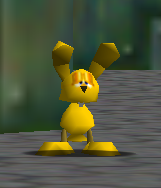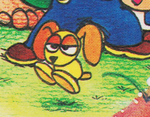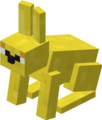MIPS: Difference between revisions
No edit summary |
m (→Super Mario 64) Tag: Mobile edit |
||
| Line 10: | Line 10: | ||
==History== | ==History== | ||
===''Super Mario 64''=== | ===''Super Mario 64''=== | ||
In ''Super Mario 64'', MIPS first appears after the player collects 15 [[Power Star]]s. When Mario approaches MIPS, the latter runs away. After Mario catches him, he rewards Mario with a Power Star, saying that [[Bowser]] gave it to him. MIPS appears in the basement a second time after Mario has collected 50 Power Stars, and he can catch MIPS again for another Power Star. MIPS does not reappear for the rest of the game after that. | In ''Super Mario 64'', MIPS first appears after the player collects 15 [[Power Star]]s. When [[Mario]] approaches MIPS, the latter runs away. After Mario catches him, he rewards Mario with a Power Star, saying that [[Bowser]] gave it to him. MIPS appears in the basement a second time after Mario has collected 50 Power Stars, and he can catch MIPS again for another Power Star. MIPS does not reappear for the rest of the game after that. | ||
Along with | Along with Mario, MIPS was the first character created for ''Super Mario 64''. He was used extensively in early [[Nintendo 64]] test simulations and ultimately made it into the final game because the development team liked him so much.<ref>{{cite|archive=web.archive.org/web/20100218201702/http://www.miyamotoshrine.com/theman/interviews/1096.shtml|deadlink=yes|title=Shigeru Miyamoto Interview from Nintendo Power (October 1996)|publisher=Miyamoto Shrine}}</ref> MIPS is named after the {{wp|MIPS architecture|MIPS}} (Microprocessor without Interlocked Pipeline Stages) microprocessor, the instruction set used in the Nintendo 64. Several of MIPS's lines reference the {{wp|White Rabbit}} from ''{{wp|Alice's Adventures in Wonderland}}''. | ||
MIPS does not make a reappearance in ''[[Super Mario 64 DS]]'', instead being replaced by the rabbits scattered throughout the castle for each player character to find. They are modeled after MIPS, but they do not give up Power Stars. Instead, they give up [[key]]s to unlock [[minigame]]s in the [[Rec Room (Super Mario 64 DS)|Rec Room]]. Two of Mario's, one of [[Wario]]'s, and one of [[Yoshi]]'s rabbits can be found in the same location MIPS was in the original game. The rabbits are also internally named "MIP"<ref>''Super Mario 64 DS'' internal object name (<tt>MIP</tt>)</ref> with their key known as a "MIP Key,"<ref>''Super Mario 64 DS'' internal object name (<tt>OBJ_MIP_KEY</tt>)</ref> with the former corroborated by the Shogakukan guide. | MIPS does not make a reappearance in ''[[Super Mario 64 DS]]'', instead being replaced by the rabbits scattered throughout the castle for each player character to find. They are modeled after MIPS, but they do not give up Power Stars. Instead, they give up [[key]]s to unlock [[minigame]]s in the [[Rec Room (Super Mario 64 DS)|Rec Room]]. Two of Mario's, one of [[Wario]]'s, and one of [[Yoshi]]'s rabbits can be found in the same location MIPS was in the original game. The rabbits are also internally named "MIP"<ref>''Super Mario 64 DS'' internal object name (<tt>MIP</tt>)</ref> with their key known as a "MIP Key,"<ref>''Super Mario 64 DS'' internal object name (<tt>OBJ_MIP_KEY</tt>)</ref> with the former corroborated by the Shogakukan guide. | ||
Revision as of 16:24, February 18, 2024
| MIPS | |
|---|---|
 MIPS, in his original Super Mario 64 appearance | |
| Species | Rabbit |
| First appearance | Super Mario 64 (1996) |
| Latest appearance | Super Mario 3D All-Stars (2020) |
- “Yeeoww! Unhand me, brute! I'm late, so late, I must make haste! This shiny thing? Mine! It's mine. Finders, keepers, losers... Late, late, late... Ouch! Take it then! A gift from Bowser, it was. Now let me be! I have a date! I cannot be late for tea!”
- —MIPS, Super Mario 64
MIPS,[1] also known as the Yellow Rabbit,[2] is a minor character found in the basement of the Mushroom Castle in Super Mario 64. He is Princess Peach's pet rabbit.[3]
History
Super Mario 64
In Super Mario 64, MIPS first appears after the player collects 15 Power Stars. When Mario approaches MIPS, the latter runs away. After Mario catches him, he rewards Mario with a Power Star, saying that Bowser gave it to him. MIPS appears in the basement a second time after Mario has collected 50 Power Stars, and he can catch MIPS again for another Power Star. MIPS does not reappear for the rest of the game after that.
Along with Mario, MIPS was the first character created for Super Mario 64. He was used extensively in early Nintendo 64 test simulations and ultimately made it into the final game because the development team liked him so much.[4] MIPS is named after the MIPS (Microprocessor without Interlocked Pipeline Stages) microprocessor, the instruction set used in the Nintendo 64. Several of MIPS's lines reference the White Rabbit from Alice's Adventures in Wonderland.
MIPS does not make a reappearance in Super Mario 64 DS, instead being replaced by the rabbits scattered throughout the castle for each player character to find. They are modeled after MIPS, but they do not give up Power Stars. Instead, they give up keys to unlock minigames in the Rec Room. Two of Mario's, one of Wario's, and one of Yoshi's rabbits can be found in the same location MIPS was in the original game. The rabbits are also internally named "MIP"[5] with their key known as a "MIP Key,"[6] with the former corroborated by the Shogakukan guide.
Mario no Bōken Land
MIPS makes a cameo in the Super Mario 64 storyline of Mario no Bōken Land.
Mario Party 3
MIPS makes a cameo appearance in Mario Party 3 in Woody Woods, where several can be seen gathering near the item shop. MIPS appears in three colors: yellow, pink, and orange, which are colors matching the rabbits that replace MIPS in Super Mario 64 DS (the only absent color is green).
Minecraft
In the Super Mario Mash-up in Minecraft, the Gold Rabbits are re-skinned to look like MIPS.
Gallery
Names in other languages
| Language | Name | Meaning | Notes |
|---|---|---|---|
| Japanese | ミップ[3] Mippu |
MIP | |
| French | MIPS[?] | - | |
| German | MIPS[?] | - | |
| Italian | Mips[7] | - | |
| MIPS[8] |
Trivia
- Mario was originally able to throw MIPS, but this was removed.[9]
- Originally, a rabbit that is most likely MIPS was going to be raced, but it ended up being replaced by Koopa the Quick in the final due to Mario not being able to keep up with it because it was too fast during testing.[10]
References
- ^ Super Mario 64 Player's Guide. Nintendo Power. Page 49, 43, 44, 83, and 103.
- ^ February 24, 1998. "Bonus Stars" - Nintendo: Super Mario 64 Strategy. Nintendo.com. Archived February 24, 1998, 19:40:31 UTC from the original via Wayback Machine. Retrieved February 23, 2018.
- ^ a b 「ピーチ姫の飼っているウサギ。」 (Princess Peach’s pet rabbit.) – 2015. Super Mario Bros. Hyakka: Nintendo Kōshiki Guidebook, Super Mario 64 section. Shogakukan. Page 85.
- ^ Shigeru Miyamoto Interview from Nintendo Power (October 1996). Miyamoto Shrine. Archived February 18, 2010, 20:17:02 UTC from the original via Wayback Machine.
- ^ Super Mario 64 DS internal object name (MIP)
- ^ Super Mario 64 DS internal object name (OBJ_MIP_KEY)
- ^ Super Mario Bros. Enciclopedia. Page 85.
- ^ Super Mario Bros. Enciclopedia. Page 93.
- ^ TCRF. Prerelease:Super Mario 64 (Nintendo 64). The Cutting Room Floor. Retrieved January 19, 2017.
- ^ Super Mario 64 – 1996 Developer Interviews. shmuplations.com. Retrieved September 10, 2018.




